![]()
Sun, June 19, 2011 | The Meir Amit Intelligence and Terrorism Information Center

Ayman al-Zawahiri, left, sitting next to Osama bin Laden, praises those who attacked the United States on September 11, 2001 (YouTube video, April 15, 2002).
Profile of Dr. Ayman al-Zawahiri, Osama bin Laden’s Heir as Leader of Al-Qaeda
Overview
On June 16 Al-Qaeda announced that after a period of consultations, Dr. Ayman al-Zawahiri had been appointed as Osama bin Laden’s heir. The announcement stressed Al-Qaeda’s commitment to jihad, which was the “personal duty of every Muslim.” The jihad would be waged against the various “infidels” — the United States, Israel and the Arab-Muslim rulers, “until the Resurrection.”[1] This study profiles Ayman al-Zawahiri, his ideology and activities, and evaluates the possible outcome of his appointment as leader of Al-Qaeda.
Sheikh Dr. Ayman Mohammed Rabi’a al-Zawahiri (Abu Mohammed) was born in 1951 to a wealthy family whose members held senior positions in the Egyptian religious establishment. His piety was evident from an early age, and at 14 he joined the Muslim Brotherhood. In his youth he was influenced by the ideology of Sayyid Qutb, a central figure in the Muslim Brotherhood, who developed the radical Islamic ideology from which the extremist faction of the Muslim Brotherhood sprang. He began studying medicine at the University of Cairo in 1968 and graduated with honors in 1974. He specialized in surgery at a university in Pakistan, receiving a PhD, again graduating with honors.
When Sayyid Qutb was executed by Nasser in 1966 and thousands of Muslim Brotherhood activists were imprisoned, al-Zawahiri, along with a number of other young men, set up an underground cell (1966-1967) with the intention of overthrowing the Egyptian regime and establishing an Islamic government. During the 1970s, while still at school, he joined an extremist Islamic organization called the Islamic Jihad, which was behind a wave of terrorist attacks in Egypt, and became one of its most prominent operatives. In 1991 he formally became the organization’s head.
Following the assassination of Anwar Sadat in October 1981, al-Zawahiri was arrested along with other radical Islamic operatives. He was cleared of involvement in the assassination because of lack of evidence, but convicted of membership in a terrorist organization and having weapons and explosives in his possession. He was sentenced to a term of three years in prison, which he served from 1981 to 1984. In his book Knights Under the Prophet’s Banner he said that assassinating Sadat was part of a comprehensive program of assassinating senior figures in the Egyptian regime and using the army to take over vital broadcasting stations.
After his release from prison he went from Egypt to Jeddah in Saudi Arabia to practice medicine and to promote the activities of the Egyptian Islamic Jihad beyond the borders of Egypt. There he apparently met Osama bin Laden for the first time, and from Saudi Arabia he went to Pakistan and Afghanistan to wage his jihad against the Egyptian regime. While in Peshawar, Afghanistan, he founded an organization called Talai’i al-fath (“pioneers of conquest”), which in effect served as the operational wing of the Egyptian Islamic Jihad. He established a network of bases, training camps and headquarters, all with the support of Osama bin Laden.
At the beginning of the 1990s al-Zawahiri and bin Laden went to Sudan, where they set up a network of bases. During the 1990s he also set up a new network in Yemen, from which he conducted a campaign of terrorist attacks against Egyptian targets, both inside and outside Egypt. He was also involved in an attempt to assassinate Egyptian President Hosni Mubarak and the murder of tourists in Luxor in 1997. He was apparently also involved in the attempted assassination of President Mubarak in Ethiopia in July 1995. Because of his involvement in terrorist attacks, he was sentenced to death in absentia in Egypt, April 1999.
Al-Zawahiri’s involvement in terrorism in the 1990s did not focus only on the Egyptian arena. In the middle of the decade, instructed by bin Laden, he constructed Al-Qaeda terrorist networks in Britain and the United States, strengthened the radical Islamic militias in the Balkans, supported radical Islamic groups in Somalia and Ethiopia and aided the rebels in Chechnya. In 1996, with two other operatives, he tried to enter Chechnya and was arrested by the Russian security forces, only to be released “for lack of evidence.”
At the beginning of 1998 al-Zawahiri and Osama bin Laden founded the International Islamic Front for Jihad against Jews and Crusaders. It was an umbrella network for Al-Qaeda, the Egyptian Islamic Jihad and various radical Islamic organizations operating in countries such as Pakistan, Bangladesh, Kashmir and the Philippines. Al-Zawahiri became bin Laden’s deputy in the Front and second in command of Al-Qaeda. In June 2001 al-Zawahiri announced the formal union of all the organizations, whose official name is [Tanzim] Qaedat al-Jihad (the formal name of Al-Qaeda to this day).
In February 1998 Qaedat al-Jihad issued an appeal calling for the killing of Americans throughout the world, saying it was the “personal duty” of every Muslim. In practical terms, Al-Qaeda initiated a campaign of global terrorism against the United States, beginning with the terrorist attacks of the American embassies in Kenya and Tanzania in August 1998, and culminating with the September 11, 2001 attacks.
Al-Zawahiri continued holding key positions in Al-Qaeda (as far as is known, he was responsible for producing anthrax spores for the organization) and became even more dominant than bin Laden in Al-Qaeda’s global propaganda campaign.
His worldview and ideology:
1) As noted, al-Zawahiri was particularly influenced by the radical Islam of Sayyid Qutb, according to which the Arab-Muslim regimes (“the internal enemy “) were no less dangerous than external enemies. His ideology justified using violence and terrorism against them, since, it claimed, they had deviated from the precepts of Islam and did not govern according to religious Muslim law (the Shari’a). He was also influenced by Dr. Abdullah Azzam, a Palestinian from northern Samaria, who became Osama bin Laden’s ideological mentor. Azzam developed and institutionalized the concept of jihad as the “personal duty” of every Muslim.
2) Based on experienced gained from decades of terrorist activity, al-Zawahiri formulated his worldview of radical jihadist Islam. According to his worldview, a global jihad movement was necessary, based on a territorial infrastructure which would serve as a “hothouse” for breeding the jihadist campaign (in a region such as Afghanistan, although al-Zawahiri would have preferred to locate the hothouse in the Arab Middle East). Young men imbued with radical Islamic ideology would be sent from the hothouse to wage a violent campaign against Islam’s various enemies: the “treacherous” Arab-Muslim regimes, the superpowers (the United States, the main enemy, and Russia), other countries hostile to Islam (especially those in Western Europe), and the State of Israel, as well as Jews around the world.
Al-Zawahiri’s ideology expresses particular hostility and hatred for the State of Israel, which he regards as the spearhead of the Christian West (the “Crusaders”) in the Middle East, and to the Jews in general (his ideology incorporates anti-Semitic motifs directly from The Protocols of the Elders of Zion).
Al-Zawahiri calls for a violent jihad against Israel as the only way to “liberate Palestine,” and advocates attacking Jews around the globe. Israel was also mentioned in the Al-Qaeda announcement naming al-Zawahiri as its leader. In our assessment, under al-Zawahiri Al-Qaeda will increase its attempts to attack Israel. As for the Jews, al-Zawahiri has often specifically instructed Muslims to attack Jews beyond the borders of Israel, and Al-Qaeda has been and will continue to be involved in attacks against Jewish targets all over the world. At the same time, he will pursue his activities against Christians, the United States and Western countries, and against the Arab-Muslim regimes.
The uprisings taking place in the Arab world during the first half of 2011 are an ideological challenge for Al-Qaeda. That is because they are based, at least partially, on an agenda of freedom, which is completely opposed to jihadist ideology. Moreover, Al-Qaeda and the Islamists have so far not played a significant role in them. Al-Zawahiri expressed support for the overthrow of regimes of Mubarak in Egypt and Ben Ali in Tunisia, accused them of corruption and serving the interests of the United States, encouraged the Libyan “jihad fighters” (mujahideen) for their actions against Qaddafi’s regime, and called for the establishment of “just Islamic regimes” in the Arab countries, where religious Islamic law (Shari’a) would prevail. He also expressed support for the uprisings in Syria and Yemen.
The Significance of Appointing al-Zawahiri as Al-Qaeda’s Leader
Al-Zawahiri’s appointment to the leadership of Al-Qaeda was expected, although it took several weeks instead of occurring immediately. He had the reputation of being the “brain” behind Al-Qaeda and its head ideologue,[2] amassed considerable operational and organizational experience in terrorism and possibly, at various times in recent years, even the de facto head of the organization.
According to Al-Qaeda’s bylaws written 2002, which are apparently still in force, the organization’s second in command is supposed to succeed the leader (emir) should he be killed or captured without hope of release.[3] Appearing in a video issued on June 8, 2011, a month after the death of bin Laden, al-Zawahiri promised the United States he would continue Osama bin Laden’s path of jihad, thus positioning himself as bin Laden’s heir [at that time there had not yet been an official confirmation of his appointment, which came eight days later].
The possible consequences of al-Zawahiri’s appointment for Al-Qaeda’s nature and methods are the following: Ideologically, because of his usually close cooperation with bin Laden and their mutual worldview, it is unlikely that significant changes will be made in its concept of waging a global jihad against the United States and its allies. However, it is possible that changes may occur in Al-Qaeda’s order of priorities, due to al-Zawahiri’s worldview, personality, Egyptian origin and personal experience.
Al-Zawahiri’s Achilles’ heel, the fact that he does not have bin Laden’s charisma and his leadership is not a foregone conclusion, may influence Al-Qaeda in the future. Thus potentially, power struggles may arise over the “inheritance” of the Al-Qaeda leadership, and charismatic local commanders with their own power bases or operational terrorist experience may make demands for leadership or act independently.
Al-Zawahiri may give high priority to terrorist attacks against Arab-Muslim regimes he considers Western collaborators and enemies of Islam, as well as against Israel (possibly from Al-Qaeda bases in the areas on its borders, especially the Gaza Strip) and against Jewish targets around that globe. He may emphasize terrorist activity in Egypt, exploiting the collapse of the Mubarak regime, the weakening of internal security control, the legalization of the Muslim Brotherhood and its return to the forefront of the political stage; and al-Zawahiri’s long experience with subversion and terrorism within Egypt. At the same time, the United States and Western countries will continue to be perceived as a prime target.
Organizationally, Al-Qaeda’s financial capabilities may be affected because al-Zawahiri lacks bin Laden’s resources. If that happens, its operational and logistic capabilities may suffer. It is also possible that there will be changes in Al-Qaeda’s structure and methods, with the decentralization of various local focal points, the result of possible power struggles and al-Zawahiri’s difficulties in enforcing his authority on local commanders in distant confrontation arenas.
Sources Used in This Study
This study is based on the following sources: an analysis of videos and audio cassettes issued by al-Zawahiri (many of them on YouTube); his book, Knights Under the Prophet’s Banner, translated into English by Laura Mansfield (first edition); a book in Arabic about al-Zawahiri by Montasser al-Zayat, an Egyptian lawyer affiliated with the Islamic movement, called Ayman al-Zawahiri As I Knew Him; an article by Dr. Nimrod Raphaeli about al-Zawahiri’s life and activities (published 2002); books and reports, including those issued by research institutes dealing with global terrorism; Islamic Internet forums; interviews with experts on Al-Qaeda and the global jihad which appeared in the global media and information based on security sources.

Left: The front cover of Laura Mansfield's book, containing the translations of the first edition of al-Zawahiri's book and various public messages he issued. Right: The front cover of a book by Montasser al-Zayat, an Egyptian lawyer, about Ayman al-Zawahiri.
This study is divided into the following sections:
1) Biography
2) Islamists who influenced al-Zawahiri’s ideology
3) Overview of al-Zawahiri’s ideology
4) Al-Zawahiri’s position on the United States
5) Al-Zawahiri’s position on Western Europe
6) Al-Zawahiri’s position on the State of Israel and the Jewish people
7) Al-Zawahiri’s position on the Arab and Muslim regimes
8) Al-Zawahiri’s position on the Muslim Brotherhood
9) Al-Zawahiri’s criticism of the Hamas movement
10) Al-Zawahiri’s centrality in the battle for hearts and minds
11) Initial evaluation of the significance of al-Zawahiri’s appointment as Al-Qaeda leader
Biography
Ayman Muhammad Rabi’a al-Zawahiri was born in 1951 into a respected family of academics and clerics living in the wealthy al-Maa’di suburb of Cairo. His father, Muhammad Rabi’a al-Zawahiri, was a professor of pharmaceutics at the Ein al-Shams University.
His paternal grandfather, Sheikh Muhammad al-Zawahiri, was one of the senior clerics of Al-Azhar mosque who opposed the British and criticized the royal family. His maternal grandfather, Abd al-Rahman Basha Azzam, was the first secretary-general of the Arab League.[4] An uncle on his mother’s side, Salem Azzam, was director of the Islamic Council of Europe, an Islamic organization based in London and founded in 1973 (which today is apparently defunct). Another maternal uncle, Mahfouz Azzam, was deputy head of the Islamic party, Hizb al-Amal, in Egypt, whose activities were frozen in 2000, and had connections, in the past at least, with the Muslim Brotherhood.
Even as a child al-Zawahiri was particularly devout. He prayed often and went to the Hussein Sidqi mosque in Cairo’s al-Maa’di neighborhood. He also participated in the Qur’an interpretation sessions (tafsir) held at the mosque. A childhood friend described him as introverted as a child and adolescent and not partial to games, preferring to read various types of books, including poetry, and especially about Islam. He was described as modest, but adamant during arguments.
When he was 14 he joined the Muslim Brotherhood, and from a young age wanted to realize Sayyid Qutb vision of instituting a radical Islamic government in Egypt.[5] The following year, 1966, Sayyid Qutb was executed by Nasser and al-Zawahiri, along with a number of other students, set up a covert cell (1966-1967) whose aim was to overthrow the Egyptian regime and establish an Islamic government in its place. He was motivated to form the cell by the arrest of thousands of Egyptian Muslim Brotherhood activists in 1965. The arrests led Islamic circles to discuss the question of how to respond, perceiving the event as an overall anti-Islamic act.
In 1968 al-Zawahiri entered Cairo University to study medicine. He graduated with honors in 1974 and specialized in surgery, graduating in 1978. He continued his studies at a university in Pakistan, receiving a PhD in surgery, again with honors.[6]
In 1979, in a traditional Muslim ceremony, he married Izzat Ahmed Nuwar, a graduate of Cairo University’s philosophy and literature department. She gave birth to at least four daughters and a son. Two of the daughters were killed when the Americans bombed Afghanistan after September 11, 2001. Another daughter was born in 2005. Acquaintances report that she was the only woman in his life, as opposed to bin Laden, who married a number of times.[7]
During the 1970s al-Zawahiri joined the Egyptian Islamic Jihad (Jama’at al-jihad alislami), which at the time was responsible for a number of terrorist attacks, among them one on the security directorate in Asyut; he was one of its leading operatives. In 1991 he officially became head of the organization, although in effect he was already its leader.[8]
Following Sadat’s assassination, al-Zawahiri was arrested. He was found not guilty of participation in the assassination, but convicted of membership in a terrorist organization and of possessing weapons and explosives. He was sentenced to a term of three years in prison, which he served from 1981 to 1984. Montasser Al-Zayat, an Egyptian lawyer who represented Islamists, claimed that al-Zawahiri, tortured while in prison, revealed the location of Essam al-Qamari, an operative of the same underground jihad cell. Al-Qamari was arrested and executed by the Egyptian authorities. Al-Zawahiri’s younger brother, Muhammad, was also arrested, and later accompanied him on his jihad path.[9]

Ayman al-Zawahiri during his trial in 1981 after the murder of Sadat. In English he says that oppression, dictatorship and corruption led to Sadat's assassination (YouTube)
In his book Knights Under the Prophet’s Banner, published in December 2001, he said that the assassination of Sadat was one stage of a comprehensive plan to assassinate senior figures in the Egyptian regime and use the army to take over vital broadcasting stations. Despite the success of the first stage, the rest failed because of “bad planning and insufficient preparation.”
Al-Zawahiri claimed that Sadat’s assassination bolstered the daring and general activism of the Islamic factions, and expressed the belligerence of the jihad fighters (mujahideen). In addition, he claimed that it exposed the need for a change in the Egyptian regime and also increased their belligerence toward the United States and Israel, which supported Sadat’s regime.[10]
In 1984 al-Zawahiri was released from prison. The following year he went to Jeddah, Saudi Arabia, to work in a clinic and promote the jihad movement beyond the borders of Egypt. During that period many Egyptian Islamist activists escaped to Saudi Arabia, and Jeddah became an important center for their activities. In Jeddah al-Zawahiri apparently crossed paths with Osama bin Laden for the first time, and from then on they were generally together. From Saudi Arabia al-Zawahiri went to Pakistan and Afghanistan, looking for a secure place to carry out a jihad campaign against the Egyptian regime, since repressive measures were being carried out by the Egyptian security services within the country.[11]
In 1987, while in Peshawar, Pakistan (which in the 1980s had served as a launching pad for Islamic operatives waging jihad in Afghanistan), he founded an organization called Talai’i al-fath (“pioneers of conquest”), which in effect served as the operative wing of the Egyptian Islamic Jihad. It operated in Pakistan and Afghanistan, and later in Sudan as well (See below). Al-Zawahiri set up headquarters in Afghanistan, adding a network of training camps, offices and a Shura Council (a kind of directorate for his organization). Bin Laden provided financial support, helped in training operatives and organized hiding places.[12] In 1988, following a disagreement with other Islamists operating in Afghanistan and Pakistan, al-Zawahiri appealed to Iran for help[13] (since the original appeal, the nature of his relations with Iran has been unclear).
After the death of Abdullah Azzam in 1989 bin Laden and al-Zawahiri worked together more closely. They decided that the Egyptian jihad organization would retain its Egyptian identity while Al-Qaeda, which had been established during the 1980s as a multinational network and melting pot for Arab operatives in Afghanistan, would also retain its original character.[14] At the end of 1990, after a disagreement between the Taliban government and the Arab operatives in Afghanistan, al-Zawahiri and bin Laden moved to Sudan, where they set up a new terrorist infrastructure. Bin Laden, who had invested a great deal of money in Sudan, which at that time was suffering from a financial crisis, was in contact with the heads of the Sudanese regime, helping them receive support and protection.[15]
During the 1990s al-Zawahiri established a “pioneers of conquest” (Talai’i alfath) terrorist infrastructure in Yemen, founded to reestablish the Egyptian Islamic Jihad and reproduce its “successes” (which had culminated in Sadat’s assassination). It had training camps which attracted terrorist operatives from Egypt, Sudan, Afghanistan and Saharan Africa, and taught them guerilla warfare and how to manufacture IEDs.[16]
Based in Yemen, al-Zawahiri was involved in a series of terrorist attacks on Egyptian targets, both inside Egypt and beyond its borders: the attempted assassination of the Hassan al-Alfi, the Egyptian interior minister, in August 1993; the car bomb which exploded near the convoy of A’atef Sidqi, the Egyptian prime minister, in November 1993; and a second attempt on Sidqi’s life. Apparently al-Zawahiri was also involved in the attempted assassination of President Hosni Mubarak in Ethiopia in July 1995. He was involved in the bombing of the Egyptian embassy in Pakistan in November 1995 and in the massacre of the tourists at Luxor in November 1997. In April 1999 he was sentenced to death in absentia in Egypt for his involvement in terrorism.[17]
Between 1994 and 1995, acting on bin Laden’s instructions, al-Zawahiri extended his activity against American targets in the Middle East. He also made plans to strengthen the terrorist networks in London and New York, to reinforce the Islamic militias in the Balkans and support Islamist groups in Somalia and Ethiopia. According to information from the Egyptian media, during those years he met with Arab terrorists in Khartoum, Tehran and Cyprus, among them Hezbollah’s Imad Mughnieh, Hamas’ Musa Abu Marzuq and Fathi Shqaqi, who headed the Palestinian Islamic Jihad.[18] In addition, according to one publication, during the 1990s a number of Al-Qaeda operatives met with Hezbollah operatives at one of its training camps in Lebanon.[19]
In December 1996, as part of his intensive efforts to increase Al-Qaeda’s operational capabilities, using the pseudonym “Mr. Amin” al-Zawahiri tried to enter Chechnya along with two operatives (who carried forged Sudanese passports) and a Chechen guide. Their objective was to set up a base in Chechnya. The group was arrested and tried by the Russian security forces. At his trial al-Zawahiri claimed that he had come to Chechnya on business. In April 1997 he was released by the Russians “for lack of evidence.” A computer taken from him, which later fell into the hands of a Wall Street Journal reporter, revealed information about al-Zawahiri’s past activities.[20]
In 1996 al-Zawahiri returned to Afghanistan, which he had visited a number of times in the past. He and bin Laden founded the International Islamic Front for Jihad against Jews and Crusaders, which united Al-Qaeda, the Egyptian Islamic Jihad, the Council of Islamic Scholars of Pakistan, and the Bangladesh Jihad.
Al-Zawahiri was appointed as bin Laden’s deputy in the Front, which was later joined by other organizations, among them the Kashmiri Al-Ansar and an organization called Abu Sayaf, which operated in the Philippines and East Asia. Actually, each organization in the Front retained a large measure of independence. At that time there was a de facto union of Al-Qaeda and the Egyptian Islamic Jihad, and al-Zawahiri became second in command of Al-Qaeda. In June 2001 Osama bin Laden and al-Zawahiri formally announced the de jure union of the organizations, to be known as [Tanzim] Qaedat al-Jihad.[21]
In February 1998, the Front, which was in effect an umbrella network for radical Islamic organizations, issued an appeal containing a fatwa (religious edict) stating that Muslims were duty-bound to kill American soldiers and civilians wherever they were found, and to take control of their property. It also issued a call to kill America’s military and civilian allies. The open letter declared that the instructions were a “personal duty” (fard a’yn) of every Muslim who was capable of carrying them out, until Al-Aqsa mosque and the Kaaba compound (masjdin al-haram) Mecca, Saudi Arabia, had been liberated.[22]
Al-Zawahiri became bin Laden’s deputy in Al-Qaeda. He was responsible, according to various sources, for producing anthrax spores for Al-Qaeda, to be used in terrorist attacks.[24] Our information about the project is sketchy and it is not clear how successful Al-Qaeda was, and apparently there were difficulties. In any event, the American forces operating in Afghanistan after September 11 found proof that Al-Qaeda had a laboratory for the production of biological weapons using anthrax spores.[25]
Islamists Who Influenced al-Zawahiri’s Ideology
In his youth al-Zawahiri was influenced by the radical Islam of Sayyid Qutb, an Egyptian ideologue and one of the heads of the Muslim Brotherhood, who was executed by Nasser’s regime in 1966. In Knights Under the Prophet’s Banner he praised Sayyid Qutb, describing him as a key figure in the development of the Muslim Brotherhood’s ideology. He said his execution was a turning point, the event that lit the spark that eventually led to the development of the Islamic movement, although Nasser’s regime thought it would suppress it. According to the book, Sayyid Qutb helped Muslims define their enemies, especially internal enemies, who were no less dangerous than the external, because they served as proxies for foreign enemies against Muslims.
According to al-Zawahiri, Sayyid Qutb’s ideology sowed the seeds for an Islamic revolution which justified the use of violence, externally as well as internally. He mentioned Sayyid Qutb’s great ideological contribution to the Egyptian Islamic Jihad movement, which eventually became the global jihad. His main contributions were the concept that sovereignty belongs only to Allah; the need for all the Islamic movements to join forces; the creation of the first nucleus [i.e., of the global jihad] in leading the Egyptian Islamic Jihad; the decision to fight “the enemy at home” [in this case, the Egyptian authorities] because of their persecution of Islamists and because the internal enemy is the proxy of Western anti-Islamics; the need to institute the Shari’a in Egypt (by force if necessary) to turn it into an Islamic country; the repeal of man-made laws in every country and their replacement with the Shari’a.[26]
Besides Sayyid Qutb, al-Zawahiri was influenced by other radical Islamist figures who disseminated the concept of radical Islamic jihadism:
1) Dr. Abdullah Azzam, a Palestinian from northern Samaria, who became bin Laden’s spiritual mentor and whose influence is readily apparent in al-Zawahiri’s ideology. His main contribution was in establishing and developing the concept of the jihad as the personal duty (fard a’yn) of every Muslim. To a great extent Abdullah Azzam was also influenced by Sayyid Qutb, and their ideologies overlap. However, practically speaking, at the end of the 1980s there was a power struggle between Abdullah Azzam and al-Zawahiri, the result of their rivalry for proximity to bin Laden and access to his financial resources. At the height of the rivalry, Abdullah Azzam was killed by a bomb placed in his car, apparently through Soviet agency. It was rumored within jihadist circles that al-Zawahiri was behind the explosion and that he had given the Soviets information about where Abdullah Azzam could be found.[27]
2) Muhammad Qutb, Sayyid Qutb’s brother, wrote books reflecting Sayyid Qutb’s ideology and also disseminated his books. Al-Zawahiri knew Muhammad Qutb, who taught Islamic studies in Saudi Arabia, and was one of his followers during the 1980s when he left Egypt for Saudi Arabia.[28] Osama bin Laden was apparently also influenced by Muhammad Qutb.

Al-Zawahiri interviewed by Al-Jazeera TV "(Bearing arms) is the duty of every Muslim who is able to bear them (Posted on YouTube, January 2009)
3) Dr. Saleh Sariya, a Palestinian who was one of the heads of the so-called “Liberation Party” (Hizb al-tahrir), an extremist Islamist movement whose activities were banned in the Arab countries in general and in Egypt in particular. He had an important position in the Arab League’s educational system. Al-Zawahiri praised him for his involvement in the terrorist attack on the military technical college in Heliopolis in 1974, the first significant attack carried out in Egypt after the Six Day War. The attack failed, some of the attackers were killed, and others, including Sariya — who refused to accede to the requests of his supporters (including his wife) to ask the authorities for a pardon — were arrested and later executed.[29] Al-Zawahiri had been influenced by Sariya’s fiery speeches and admired him, although they had never met.
Overview of al-Zawahiri’s Ideology
In his book Ayman al-Zawahiri wrote that he had formulated his concept of global Islam between 1980 and 1981, the first time he was in Peshawar, and when he had witnessed the jihad in Pakistan as a doctor, and in Afghanistan in 1986. The practical experience he gained during those years provided him with important insights into how a global jihad movement should be conducted:
1) It had to have a regional territory that could be used as a hothouse, a breeding ground from which jihad fighters could be continuously dispatched to inject new blood into the ranks of the fighters bearing the burden of jihad [Afghanistan serves as such a hothouse, although al-Zawahiri would prefer one in the Arab Middle East].
2) The young jihad fighters had to be imbued exclusively with Islamic spirit, rejecting national-territorial Arab ideology.
3) It had to be made clear to Muslim jihad fighters that all non-Muslims operating against them under various flags were their true enemies.
4) Authentic jihad could conquer non-Muslim superpowers such as the Soviet Union and the United States by creating an alliance of Muslim fighters around the globe.[30]
5) For the jihad in Afghanistan to succeed [and by implication, serve as a model for jihad in other locations], respectable, wealthy Muslims around the world had to provide support, rather than being supported by non-Muslims.
In his book he set out his jihadist worldview. As an ideologue and professionally as a physician, he diagnosed the situation in the world in general and in Egypt in particular to understand the essence of the Muslim nation’s problem. His basic hypotheses were the following: the world itself was inimical to Islam because it related to Muslims as fundamentalists threatening it; the “threatening world” was composed of the UN, Muslim rulers friendly to the West, international corporations, the international media and international welfare agencies (exploited as cover for espionage, Christian preaching [i.e., evangelism], plotting revolution and importing weapons).[31]
Al-Zawahiri’s response to the threat centered on waging a jihad around the globe. He concluded that there had to be a global jihad because the local jihad campaign had failed. He gave as an example the Islamic movement in Algeria led by the Islamic Salvation Front (FIS). He said it had failed because it had not been sufficiently prepared to fight the authorities and did not receive enough support from jihad fighters (mujahideen) beyond its borders, while France helped the Algerian regime suppress it.[32]
Al-Zawahiri sought to form a radical Islamic jihad coalition which would grow and develop outside the “new world order.” The coalition, according to al-Zawahiri, would spread to all the Islamic lands from Eastern Turkistan [western China] to Spain and Portugal (Andalusia). At the coalition’s center would be the jihadist Islamic movements in Afghanistan and Chechnya. Its principles were non-surrender to Western domination; ensuring destruction of the new Crusaders operating against the lands of Islam; the readiness to take vengeance on the heads of the coalition of infidels (the United States, Russia and Israel); and seeking to avenge the blood of shaheeds throughout the lands of Islam. The ranks of the coalition would be joined by young jihad fighters (mujahideen) who had abandoned their families, countries, wealth, studies and jobs to search for [international] jihad arenas for the sake of Allah.[33]
With that in mind, al-Zawahiri formulated what he considered the plan of action necessary for realizing the global jihad. Precise preparations were necessary for jihad activities, including training, perseverance, patience and fortitude. An appropriate Muslim leadership was also necessary, which would mean replacing every Muslim leadership which was complacent or had failed.
Al-Zawahiri stressed the need to create a link between the leadership of the global jihad, as the spearhead of the Muslims, and the Muslim nation. He blamed the leadership of the Muslim countries, not the Muslim people, for insufficient participation in jihad.[34] Al-Zawahiri was of the opinion that the global jihad would expose the treachery of the Muslim rulers and their proxies who worked for the enemies of Islam, i.e., Christians and Jews. Muslims also had to beware of the clerics appointed by the political establishment, and to respect those who supported jihad.[35]
Al-Zawahiri claimed that an authentic Islamic country would be based on renewing the Caliphate and ruling it according to the tradition of the prophet Muhammad. Without such a foundation the Islamic movement could not win. He was aware that it would not be easy to renew the Caliphate, but that should be the Muslims’ vision. Therefore, if the objective of jihad was to change the Muslim world and found an Islamic state, patience was necessary to achieve victory.[36] On the other hand, he warned of being drawn into an internal conflict between Muslims and their rulers, which had nothing to do with jihad.
Al-Zawahiri strongly stated that the United States, Russia and Israel had to pay a high price for persecuting Muslims. He said that the “masters” in Washington and Tel Aviv used Muslim rulers to protect their own interests. Therefore, he said that attacking Americans and Jews in Islamic countries was not enough, and that jihad had to be waged on enemy territory to burn the hands of those who set fire to the Muslims’ country. He stressed that the Judeo-Christian alliance would not allow any Muslim force to rule a genuinely Muslim country, and that therefore the struggle against that alliance had to be waged all over the globe.[37] The Islamic movement should attack the enemy more strongly by focusing on certain aspects, among them causing the greatest number of casualties, because that was the language the West understood; there should be a focus on suicide bombing attacks which cause maximum casualties with a minimum investment; and targets should be chosen precisely to have the greatest influence on the enemy’s morale and prestige.[38]
Al-Zawahiri’s Position on the United States
Over the years, al-Zawahiri has expressed his strong hatred for the American administration and has often has quarrels with its presidents. He has condemned them for their intervention in Islamic countries and accused the United States of conspiring in “a Zionist-Crusader plot” against Muslims all over the world along with American allies in Europe and the Arab-Muslim world. He represents the global jihad against the United States and its allies as a religious war of Christians and Jews against Muslims.[39]
In Knights Under the Prophet’s Banner al-Zawahiri noted that the struggle between Muslims and “Crusaders” had to be waged in the international arena because it was global in nature and because jihad fighters provided the response to the capitalist West’s attempt to subject Muslims to a secular Western political culture incompatible with Islamic religious law.[40] In a 2009 video, al-Zawahiri said that a Christian-Jewish attack was being waged on the nation of Islam, and that “there is no way to avoid opposing the plot” and that “it must be understood that the nation of Islam is facing a satanic alliance headed by the White House.”[41] He also signed an appeal issued in 1998 calling for the murder of American civilians and military personnel, and those of their allies, wherever they might be found.
Al-Zawahiri provided several reasons for his conclusion that the United States was now the enemy of Islam: When the Second Gulf War broke out in 1991, most of the American military’s high-quality arsenal, including its naval vessels and commando units, were moved to the area to protect American interests. That, he said, led to a fundamental change in the function performed by the United States in the Middle East: previously the United States operated behind closed doors to protect its interests. Now, however, it was doing so openly and had become a direct rival of Muslims.
In addition, according to al-Zawahiri, the United States had insulted Islamic religious law and humiliated Muslims, he said, when it rejected the demand of the Mullah Omar, the leader of the Taliban, to present proof of bin Laden’s involvement in terrorism before an Islamic court could try him. According to al-Zawahiri, the United States invaded Afghanistan to preserve its oil interests. In addition, the United States was fighting Muslims in Egypt [through the regime of Hosni Mubarak]; it was supporting Israel, which was located in the heart of the Muslim world; was leading the war in Chechnya and was leading the anti-Muslim war in Somalia. He stated unequivocally that that was what American policy dealt with.[42]
In his book he described the strategies Muslims should use in their dealings with the United States and the West. He justified the use of terrorism and of killing Americans and whoever collaborated with them, including through the carrying out of suicide bombing attacks. He said that suicide bombing attacks were the most successful operations that could be used to harm the enemy, and the most economical when it came to fundamentalist [Muslim] losses. He added that the targets and types of weapons should be carefully chosen to cause the enemy the greatest amount of strategic damage and deter him enough to force him to stop his brutality.[43] In his book he called for the killing of American civilians, saying that they could be killed by simple means, from shooting them to beating them to death with iron bars or by using Molotov cocktails to burn their property. He also said that in such circumstances, suicide bombing attacks were particularly effective. He called for as much damage to be done to the enemy as possible, regardless of how long it took.[44]

Ayman al-Zawahiri on the FBI's Most Wanted Terrorists list. According to the FBI and Interpol, he was involved in the bombings of the American embassies in Tanzania and Kenya in 1998, the massacre of 67 tourists in Luxor in 1997, the attack on the Egyptian embassy in Islamabad in 1995 and the attack on a ship in the Gulf of Aden in 2000. (Note: 45)
Al-Zawahiri’s Position on Western Europe
Al-Zawahiri is also hostile to Western European countries, which he regards as American allies, and as restricting the Muslims who live in them:
1) He considers Britain an American collaborator because it fought as a United States ally against Iraq and Afghanistan. Moreover, he regards it as restricting the lives of Muslims living there. In a video issued in November 2005, he threatened Queen Elizabeth, accusing her being a threat to Islam and Muslims all over the globe. That was because, he claimed, she passed laws in Britain discriminating against Muslims and persecuting them. He also attacked the heads of the Muslim communities in Britain, claiming that they collaborated with the Queen.[46] In a video issued on July 10, 2007, he threatened to carry out a terrorist attack in Britain after the knighting of Salman Rushdie, who wrote The Satanic Verses, and regarded by many Muslims as an infidel.[47]
2) In his book he said that any country which ruled Islamic lands had to return them to the Muslims. In February 2007 he called on extremist Islamists in the Maghreb to raise the banner of jihad over North Africa and Spain to once again feel the land of al-Andalus [Andalusia] under their feet [al-Andalus refers to “Moorish Iberia,” Spain and Portugal, which were ruled by Islam for 800 years until the Moors were expelled in 1492].[48]
3) Al-Zawahiri has also threatened France and Germany. In a video issued on October 8, 2002, he said that harm would come to France and Germany if they continued intervening in the affairs of the Muslim world. On February 24, 2002, he severely criticized France for passing a law forbidding women to wear head coverings in state educational institutions.[49]
4) Al-Zawahiri was extremely critical of the cartoons of the prophet Muhammad published in Denmark. In a video issued on July 2, 2008, he said that Denmark had demonstrated, in the clearest fashion possible, its hostility to Muslims, and called on Muslims all over the globe to cause damage to Denmark, because merely boycotting Danish products was not sufficient.[50]
5) Al-Zawahiri also regards Russia as an American ally in the battle against the global jihad movement. He considers the Chechen uprising against Russia as particularly important, claiming that if the Chechen jihad manages to liberate the Caucasus from Russian domination, the region may become a refuge for many jihad fighters from around the Muslim world, especially from the Arab world. For al-Zawahiri, that may create an “Islamist belt” in Central Asia which will threaten Russia’s stability.[51]
Al-Zawahiri’s Position on the State of Israel and Jewish People
Al-Zawahiri’s ideology contains strong hatred for the State of Israel, which he regards as a Western spearhead in the Middle East, and for the Jewish people in general. He calls for a violent jihad against Israel as the only way to “liberate Palestine,” and for Jews to be attacked throughout the world. In our assessment under al-Zawahiri’s leadership of Al-Qaeda, there will be an increase in attempts to attack Israel and Israeli-Jewish targets around the world.
According to al-Zawahiri, the Zionists are allies of the “Crusaders” [i.e., the Christians], and, led by the United States, they are waging a campaign against Islam. In an article written in 1998 for a magazine called Al-Mujahidoun, he claimed that “America is completely dominated by the Jews” and that “the United States uses Israel to attack its neighbors and massacre those who live there in tranquility.”[52] In his book he wrote that the existence of the State of Israel is in the interests of the West and that Israel’s presence in the Middle East was meant to safeguard the West’s regional interests.
Al-Zawahiri’s ideology clearly contains expressions of anti-Semitism. It includes one of the main motifs of The Protocols of the Elders of Zion, according to which Jews are behind all important conspiracies conceived around the world.[53] His main claim is that the United States operates against the growing force of the international Islamic movement in the name of “the Zionist enemy” or “international Judaism,” which controls it. Since the United States and Judaism-Zionism [al-Zawahiri does not distinguish between them] conspire together to prevent the global Islamic movement from achieving its aims, both enemies must be fought with active resistance [i.e., terrorism]. The fight, he says, must be waged stubbornly and with persistence, because if the Islamic movement makes concessions now, future generations of Muslims will inherit a legacy of desperation and willingness to surrender.[54]
Al-Zawahiri stresses the path of jihad as the only path to liberate “Palestine” and rejects all forms of negotiation with Israel, a theme continuously repeated in his appeals to Hamas (See below). In a video issued on November 9, 2001, he said that “our jihad, with the help of Allah, will continue until we liberate all our holy places from the Jewish-American aggression in Palestine and the rest of the Arab world.”[55] In a video issued on July 27, 2006, he said that no compromise could be reached with Israel and that the path of jihad was the only one leading to “the liberation of all Palestine.”[56]
However, in practical terms, according to his doctrine, fighting Israel would be postponed to a later stage of the global jihad. Thus, for example, in the April 1995 issue of Al-Mujahidoun he wrote that “the road to Jerusalem will pass through Cairo, and the campaign for Jerusalem will only be won after the campaigns for Egypt and Algeria [have been won], only after Cairo has been conquered.”[57] In a video issued on July 27, 2006, he said that the war in Iraq against the United States was a bridge which would lead Al-Qaeda to the confrontation in “Palestine.” He added that an Islamic emirate should be established in Iraq “so that in the future the jihad will move forward from Iraq to Palestine.”
Several times al-Zawahiri specifically called for Jews to be attacked beyond the borders of Israel because he did not differentiate between the locations of Jewish targets. A few days after the North African wing of Al-Qaeda attacked the Israeli embassy in Mauritania (February 1, 2008), al-Zawahiri warned the Israeli ambassador against being “too happy, because the men of Al-Qaeda will soon succeed in attacking him.” He also called on Muslims in Mauritania to attack Jewish and Christian targets in North Africa to force various countries to sever their diplomatic relations with Israel.[58] In an audio cassette issued on March 24, 2008, he called on Muslims to strike Jewish and American interests and to abandon the way of thinking leading to fighting only the Jews in “Palestine.”[59]
In an audio cassette disseminated by Islamic websites on April 2, 2008, al-Zawahiri answered questions sent to him by surfers. One of the questions was why Al-Qaeda did not carry out attacks on Israel. He answered as follows: “Does the person asking the question not know that Al-Qaeda struck the Jews in Djerba, Tunisia and Israeli tourists in their hotel in Mombasa, Kenya? And that after that [Al-Qaeda] launched two rockets at an El-Al plane carrying a number [of Israelis]?… We thank the person asking the question for his positive thinking, and we promise our Muslim brothers that we will do our best to strike the Jews both inside and outside Israel, and with the help of Allah, we will succeed.” He called on the mujahideen in Egypt to “attack the interests of the Crusaders and the Jews everywhere.”[60]
Al-Zawahiri’s Position on the Arab and Muslim Regimes
Al-Zawahiri regards the Arab and Muslim regimes as “collaborating” with the Western “infidel,” and accuses them of making it possible for the West to interfere with the internal affairs of Muslim countries. In addition, he accuses the Arab regimes of corruption and of helplessness in their dealings with Israel. According to al-Zawahiri, the reason Jerusalem “fell” [in the Six Day War, 1967] was because the Arab countries and their leaders had abandoned Islam, and were leading their people along the path of corruption. He called on all Muslims to awake and understand that the jihad fighters were the only ones defending the Islamic nation.
In a video issued in January 2009 al-Zawahiri accused the regime of Hosni Mubarak in Egypt of corruption and working against Islam. He said that Al-Azhar University was now run by the state rather than by clerics, who would turn it into a model for the nation, choosing their leaders from among themselves rather than having them chosen by the regime.[61] He also blamed the Arab regimes for permitting an American presence on their soil, especially Saudi Arabia, which allowed Americans into the holiest regions of Islam. In an audio cassette released on July 19, 2010, he accused the Arab regimes of being “Zionist,” and more dangerous than “the Jewish Zionists,” because they served Israel and the United States from within.[62] He was severely critical of the regimes in Pakistan and Afghanistan, which he claimed collaborated with the United States in its campaign against Islam.[63]
Following the uprisings in the Arab world which began in 2011, al-Zawahiri issued a series of cassettes supporting the overthrow of the regimes in Tunis and Egypt. He also praised the Libyan jihad fighters for their actions against Qaddafi. In the first video issued after the death of bin Laden, he praised the actions taken to overthrow the regimes in Libya, Syria and Yemen. In previous cassettes he called for the founding of Islamic regimes in the Arab countries which would operate according to Islamic religious law (the Shari’a).
Al-Zawahiri Attacks the Arab Regimes

Left: 2009, Al-Zawahiri attacks the Egyptian regime (Al-Jazeera TV, YouTube). Right: July 19, 2010, al-Zawahiri accuses the Arab regimes of being "Zionist" (YouTube)

Left: April 2011, al-Zawahiri expresses support for the overthrow of the regimes in Tunisia and Egypt, and blesses the "heroic popular intifada" in both countries. He accuses the regimes of Mubarak and Ben Ali of corruption and of serving the United States, and calls for the establishment of "just Islamic regimes" governed by Islamic religious law, the Shari'a. He encourages the "Libyan mujahideen" for their actions against Qaddafi (Al-Jazeera TV, YouTube). Right: January 2009, al-Zawahiri denounces the "historical role of saboteur played by the house of Saud (the ruling family of Saudi Arabia) in the affairs of the (Islamic) nation," describing the members of the royal family as "agents of the Crusader West," who also serve the Zionists (Al- Jazeera TV, YouTube)
Al-Zawahiri’s Position on the Muslim Brotherhood
In his book Bitter Accounts, al-Zawahiri criticized the Muslim Brotherhood despite his original roots in the movement. He claimed that the Muslim Brotherhood had accepted the principle of democracy, while as far as he was concerned, there was no democracy anywhere in the world because it was not the will of the people that mattered, only the commands of Allah. He also criticized the movement because he claimed it had given up the path of jihad as the means of establishing an Islamic government.
Al-Zawahiri accused the Muslim Brotherhood of materialism, claiming that young people were joining it for economic reasons, in that it had vast economic resources which included business and banks, and not for spiritual reasons. He accused Hassan al-Banna, the Muslim Brotherhood’s founder, of paving the path which had led to the movement’s current situation, because he had reached an informal armistice with the Egyptian regime and recognized the Egyptian constitution.
In Knights Under the Prophet’s Banner he described the Muslim Brotherhood as being well-developed organizationally, but as having committed ideological and political suicide. He claimed that the movement had retreated from its historic positions when it swore allegiance to President Mubarak in 1987. He also claimed that it had changed its ideological worldview, and raised a new generation which cared only about the pleasures of the present life without thought for the future.[64]
Al-Zawahiri also criticized the Muslim Brotherhood for its political passivity and abstention from jihad, even though, he said, the Americans and Jews had aggressively conquered lands which belonged to Muslims and were ruling them with cruelty. Therefore, the younger generation of Muslim Brotherhood members had to act for the positive revival of Islam within their societies. That is, they had to adhere to Islamic religious law [the Shari’a] and act accordingly, adopting the model of the first generations of Islam [the Salafi], and stop inventing what they called new Muslim religious interpretation. His message was that it was better for the younger generation of Islam to bear arms and defend their religion with self respect and pride than to live with humiliation in the empire of the new world order.[65]
Al-Zawahiri’s Criticism of the Hamas Movement
Al-Zawahiri and Hamas (the Palestinian branch of the Muslim Brotherhood) have a complex relationship. It is a function of the intrinsic tension Hamas suffers by being, on the one hand, a radical Islamic jihadist movement sympathetic to similar movements operating throughout the Arab-Muslim world; on the other, however, it is a national Palestinian movement which must exhibit a degree of pragmatism, and consider the exigencies of the internal Palestinian arena and the conflict with Israel, especially after it took control over the Gaza Strip. Hamas’ participation in elections for the Palestinian Legislative Council in 2006, its takeover of the Gaza Strip in 2007, its receipt of the governmental obligations involved in the daily administration of the Gaza Strip, and its reconciliation agreement with Fatah in 2011, all created fundamental tensions between Hamas and al-Zawahiri, who preaches adherence to jihadist ideology from his place of residence far from the Palestinian arena.
In recent years al-Zawahiri has often attacked Hamas because he is of the opinion that it has abandoned its basic principles and ideology:
1) In an audio cassette issued on the night of March 4, 2006, he called on Muslims to wage a jihad against corrupt Arab regimes and Western countries. He also included an appeal to Hamas. He stressed a series of basic principles for Hamas in the spirit of extremist Islam, which, he said, would guide its steps in the Palestinian arena: attaining control, he said, was a tool for instituting the rule of Islamic law on earth and not a goal in itself. No one had the right to cede “one inch” of the territory of “Palestine,” which was land sacred to Islam (waqf) and had been occupied by infidels. “Palestine,” he said, would not be liberated by elections, only through jihad for the sake of Allah, and the jihad to liberate it was the personal duty of every Muslim, not only the Palestinians. He rejected participating in elections and in the Palestinian Legislative Council alongside secular Palestinian representatives [i.e., representatives from Fatah and the Palestinian Authority], who, he said, had “sold Palestine” and signed “agreements of surrender ” with Israel, in contradiction of religious Islamic law.
Al-Zawahiri-Khaled Mashaal Dialogue
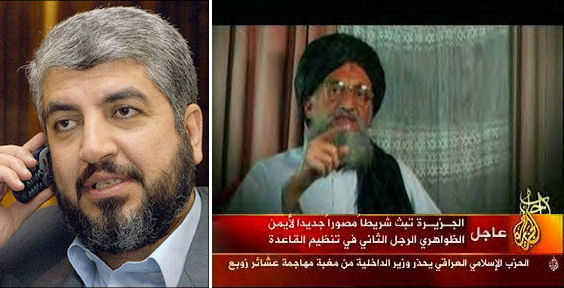
Left: Khaled Mashaal, head of the Hamas political bureau, responds: "No one can fault Hamas, because its policies are based on "resistance" (i.e., terrorism), and it refuses to surrender to the pressure exerted on it (Dunya Al-Watan, March 5, 2006). Right: Ayman al-Zawahiri appeals to Hamas to adhere to the rule of Islamic religious law, to resist the "agreements of surrender" signed by the Palestinian Authority (i.e., the Oslo Accords) and continue jihad against the "Crusader-Zionist enemy" (Al-Jazeera TV, March 5, 2006)
2) In an audio cassette broadcast by Al-Jazeera TV on March 11, 2007, al-Zawahiri attacked the Arab rulers, especially those of Saudi Arabia. He also strongly attacked the Hamas movement, accusing its leadership of having agreed to the establishment of a Palestinian unity government and thus “selling Palestine to the Jews” in return for seats in the government. He accused the Hamas leadership of sinking into a “morass of surrender” because it agreed to honor international agreements made by the Palestinian Authority when it joined the Palestinian unity government. [Note: To this day Hamas refuses to recognize the State of Israel and agreements it signed with the Palestinian Authority and the PLO.] He also claimed that the Hamas administration was dependent on foreign elements like Egypt and Israel.
Hamas responded to the attacks by claiming its policies were based on “resistance” [i.e., terrorism] to Israel, although it neither carried out terrorist attacks abroad nor attacked Western targets according to the ideology of the global jihad. It also defended its participation in internal Palestinian politics by saying it was an issue of “self respect,” and “refusal to surrender to external pressure,” refusal to recognize the “Zionist entity,” and adherence to the path of “resistance” [i.e., terrorism].
From time to time, however, Hamas publicly manifests its jihadist side through ideological solidarity with radical Islamic jihadist groups in the various arenas of confrontation (Chechnya, Iraq and Afghanistan). Moreover, Hamas spokesmen publicly denounced the killing of Osama bin Laden, calling it “a crime and state terrorism” carried out by the United States against Muslims. In a video issued on June 8, 2011, al-Zawahiri praised Ismail Haniya, head of the de facto Hamas administration in the Gaza Strip, for denouncing bin Laden’s killing.
Al-Zawahiri’s Centrality in the Battle for Hearts and Minds
Al-Zawahiri plays an extremely important role in Al-Qaeda’s propaganda network and its battle for hearts and minds. He has become a dominant figure in the open media, and has issued more videos and audio cassettes than Osama bin Laden. The main target of his media attacks is the United States, but he often rails against the “enemies” defined by his ideology, such as Hosni Mubarak’s Egyptian regime.
Al-Zawahiri is a fluent speaker with an excellent command of Arabic and knowledge of Islam. He often quotes the Qur’an and exhibits familiarity with Islamic texts. He has stock phrases which he repeats often (such as “The Crusader West and the Jews”) to inculcate his followers with his concepts. An analysis of his cassettes shows that he follows the global media and is thoroughly informed about current events.
Most of his declarations are made through websites affiliated with Al-Qaeda and radical Islam. In addition, Al-Qaeda has given cassettes of both al-Zawahiri and bin Laden exclusively to Al-Jazeera TV, which has provided an effective launching pad for its messages to the Arab-Muslim world (and also increased Al-Jazeera TV’s ratings).
One of al-Zawahiri’s most frequent themes is that the American campaign against Islam, described by the United States as the fight against terrorism, has failed, and that the global Islamic movement has only gotten stronger. For example, in April 2006, he stated that the United States and its allies gained nothing by invading Iraq, while the jihad fighters of Al-Qaeda’s branch in Iraq carried out 800 suicide bombing attacks, leaving many “Crusader” victims. He often accuses the “traitors” (the governments of the Arab states, especially of Iraq) of collaborating with the United States and helping it, stressing that Muslims face “a Zionist-Crusader-American conspiracy.

Al-Zawahiri accuses the world of a "Crusader-Zionist" attack on the Islamic nation: "There is no escape from resisting this plot…and understanding that (the Islamic nation) is facing a satanic plot whose head is in the White House" (Al-Jazeera TV and YouTube, January 2009).
Al-Zawahiri issued cassettes relating to the September 11, 2001 attacks. In a video uploaded to YouTube in April 2002, he was seen sitting next to Osama bin Laden, and congratulated those who carried out the attacks. The same month he issued an audio cassette describing the attacks as “a model for Muslim youth” and a proven example that with limited means and a small number of people, “the largest infidel power on earth could be shocked.”[66] In a video issued in July 2006 he appeared on the background of the Twin Towers as they burned, and with a picture of Muhammad Atta, one of the leaders of the attacks.

Left: Al-Zawahiri in a July 2006 video. In the background is Muhammad Atta, one of the leaders of the September 11, 2001 attacks (Al-Jazeera TV, July 27, 2006). Right: Al-Zawahiri lauds the September 11 attacks. Osama bin Laden sits next to him. The video was issued on April 15, 2002 (Picture from YouTube)
Initial Evaluation of the Significance of al-Zawahiri’s Appointment as Al-Qaeda Leader
Ayman al-Zawahiri, as Al-Qaeda’s second in command, would naturally be expected to be appointed as Osama bin Laden’s heir and head of the organization. Experts have called him the brains behind Al-Qaeda and its most important ideologue. Some of them think that in recent years he in fact led the organization and that his taking over from bin Laden is a natural occurrence.[67]
The Al-Qaeda 2002 bylaws state that the deputy to the head of the organization will inherit the leadership if the nominal head is killed or imprisoned. In addition, the longstanding ideological partnership between bin Laden and al-Zawahiri, the fact that like bin Laden, he was raised in an elitist cultural and religious environment, and the fact that he played an important role alongside bin Laden in designing Al-Qaeda and in its development for more than twenty years, all made him the leading and most logical candidate to inherit Osama bin Laden.
Nevertheless, after Osama bin Laden’s death an internal power struggle for leadership of the organization may have taken place. The fact that several weeks passed between his death and al-Zawahiri’s appointment as organization leader may hint at such a struggle.
Al-Zawahiri’s principle weakness lies in the fact that he is less charismatic than bin Laden, and his authority with the Al-Qaeda field commanders on the ground is not a foregone conclusion. According to a former FBI expert who specialized in Al-Qaeda, Al-Qaeda operatives in the Arabian Peninsula would not accept al-Zawahiri’s authority as leader because there was no consensus among them to accept him. Under such circumstances, he added, the central organization might disintegrate if charismatic local leaders in Yemen and other places became more powerful.[68]
Ideologically, there is much similarity between al-Zawahiri and Osama bin Laden, despite the various ways they emphasize terrorist attack policy. Both were influenced by the radical Islamic ideology of Sayyid Qutb and Abdullah Azzam, so apparently Al-Qaeda will retain its ideological framework.
Under al-Zawahiri’s leadership, however the fact that al-Zawahiri is of Egyptian origin and accords great importance to the organization’s activity in Egypt, more than bin Laden did (who was of Yemenite origin although he was born in Saudi Arabia), may lead Al-Qaeda to focus more on Egypt and on a greater effort to overthrow leaders in the Arab-Muslim world (by exploiting the current uprisings). That will take place concurrently with the terrorist campaign against the United States, Al-Qaeda’s most important objective in the spirit of bin Laden’s legacy (attacks in revenge for the killing of Osama bin Laden are probably on Al-Qaeda’s agenda).
Al-Zawahiri places great importance on attacking Israel and Jewish targets, in Israel proper and around the globe. Focusing on the Arab world is liable to strengthen the Al-Qaeda networks located closer to Israel’s borders in countries such as Lebanon and Syria, and in the Gaza Strip. The Gaza Strip in particular, where extremist networks affiliated with Al-Qaeda challenge Hamas, is liable to serve as a forward base for terrorist operatives who will try to infiltrate into Israel through the wide-open Israel-Egyptian border (with support from the Al-Qaeda network in the Sinai Peninsula).
From the point of view of organization and leadership, in our assessment under al-Zawahiri Al-Qaeda may suffer from various operational, logistic and economic difficulties:
1) The lack of charisma and authority (compared with bin Laden) will apparently make it hard for al-Zawahiri to unify the ranks around himself. Local commanders with operational experience or even bin Laden’s sons, who saw themselves as heirs apparent, may challenge him even though he has been formally appointed to succeed bin Laden.[69]
2) It is doubtful whether Bin Laden’s financial resources, which relied on sources in Saudi Arabia and the Persian Gulf, will be available to al-Zawahiri. If not, it may be hard for him to function effectively (we have no information about al-Zawahiri’s possible independent financial resources, since for many years he was financially dependent on bin Laden). In recent years there have been reports in the media about bin Laden and Al-Qaeda’s being in financial difficulties because of the global economic crisis.
Directions Al-Qaeda May Take, According to an al-Zawahiri Video Issued a Week before His Formal Appointment as Leader of the Organization
On June 8, 2011, a month after Osama bin Laden was killed, Ayman al-Zawahiri issued a video “promising” the United States he would continue bin Laden’s path of jihad. It was the first video issued by a senior Al-Qaeda figure after bin Laden’s death. In it al-Zawahiri swore allegiance for the second time, he claimed, to the Mullah Omar, the leader of the Taliban in Afghanistan, calling him emir al-mujahideen [leader of the jihad fighters], to receive his sponsorship after the death of bin Laden so that he could continue operating in the region of Afghanistan.[70]
The video shows that al-Zawahiri was trying to position himself as continuing bin Laden’s path and as heir to the Al-Qaeda leadership, although he did not refer to himself as such.
Al-Zawahiri began the video by eulogizing bin Laden elaborately and at length, and promised to continue his jihad path “to expel the invaders from the lands of Islam.” He then noted the various enemies against which a jihad campaign was being waged, including the United States and Western countries in general, Israel and the various regimes in the Arab-Muslim countries:
1) The United States has taken on the entire Muslim nation, which is waging jihad against it. The United States and its citizens will not be secure until there is security in Palestine and as long as the “infidel armies” have not left Muslim land. Al-Zawahiri warns the United States a number of times, mentioning September 11.
2) Even after death bin Laden will continue to pursue the United States, Israel and their allies.
3) Al-Qaeda will support the jihad fighters in Afghanistan, Pakistan, Iraq, Somalia, the Arabian Peninsula and North Africa who are fighting the “Crusaders and their allies.”
4) He encourages the jihad fighters in Palestine, thanking Ismail Haniya and others for denouncing the death of bin Laden and rejecting the United States.
5) He makes a commitment to the “Muslim peoples” not to spare any effort to liberate them from their occupiers, noting Kashmir, the Philippines, Afghanistan, Chechnya, Iraq and Palestine.
6) He expresses support for the popular revolutions in Tunisia, Egypt, Libya, Yemen and Syria, calling on the masses in Syria to “continue the struggle and jihad against the regime.”
Notes:
[1] The Al-Fajr Media Center quoted by Al-Arabiya TV, June 16, 2011. The announcement was issued by other jihadist sites as well.
[2] Laura Mansfield, His Own Words, The Translation of the Writings of Dr. Ayman al Zawahiri (USA: TLG, 2006), p. 13; http://www.csmonitor.com/2001/1031/p6s1-wosc.html; http://www.thefirstpost.co.uk/78454,news-comment,news-politics,hunt-is-on-for-ayman-al-zawahiri-brains-behind-osama-bin-laden
[3] http://www.ctc.usma.edu/wp-content/uploads/2010/08/AFGP-2002-600048-Trans.pdf, April 18, 2002.
[4] His maternal grandfather’s family had no relation to the Palestinian Azzam family to which Abdullah Azzam , bin Laden’s spiritual mentor, belonged.
[5] Sayyid Qutb, a senior Muslim Brotherhood ideologue, injected his own extremist spirit into the ideas of Hassan al-Banna and was behind the growth of the extremist faction within the Muslim Brotherhood.
[6] Al-Zayat, Ayman al-Zawahiri As I Knew Him, p. 29.
[7] Al-Zayat, Ayman al-Zawahiri, pp. 24-30; Lawrence Wright, The Looming Tower (USA: Knopf, 2006), p. 371 Wikipedia; Nimrod Raphaeli, “Ayman Rabi’ Al-Zawahiri: The Making on an Arch-Terrorist,” Terrorism and Political Violence, Vol. 14, Winter 2002, Number 4, pp. 2-3.
[8] http://www.terrorism-info.org.il/malam_multimedia/English/eng_n/pdf/ipc_e174.pdf, Al-Zayat, Ayman al-Zawahiri, pp. 29, 55.
[9] http://www.terrorism-info.org.il/malam_multimedia/English/eng_n/pdf/ipc_e174.pdf, Al-Zayat, Ayman al-Zawahiri, pp. 29, 55. For information on Muhammad al-Zawahiri, see Wikipedia.
[10] Al-Zawahiri, Knights Under the Prophet’s Banner (in Mansfield, His Own Words, pp. 60-63).
[11] http://terrorism.about.com/od/groupsleader1/p/Zawahiri.htm, Al-Zayat, Ayman al-Zawahiri, p. 54.
[12] Raphaeli, ” Al-Zawahiri,” p. 7.
[13] Ibid., p. 7.
[14] Ibid., p. 11.
[15] Ibid., p. 11.
[16] Raphaeli, ” Al-Zawahiri,” p. 11.
[17] http://www.terrorism-info.org.il/malam_multimedia/English/eng_n/pdf/ipc_e174.pdf. Al-Zayat, Ayman al-Zawahiri, pp. 26-27, 114. In his book Knights Under the Prophet’s Banner, he writes that he was one of those who planned to attack the American embassy in Islamabad, Pakistan, and only after it became evident that it was not possible, was the attack carried out against the Egyptian embassy in Pakistan. It was in response to the persecution of activists like himself by the Egyptian authorities (from Mansfield, His Own Words, pp. 25-26, 43-46). In addition, he claimed that the organization called Al-Jama’a al-Islamiyyah was responsible for the attempted assassination of Mubarak in Ethiopia (from Mansfield, His Own Words, pp. 106-108); Raphaeli, “Al-Zawahiri,” pp. 11-12.
[18] Raphaeli, ” Al-Zawahiri,” pp. 12-14, based on the Egyptian newspaper Ruz al-Yusuf, October 19, 2001.
[19] http://www.cfr.org/terrorist-organizations/al-qaeda-hezbollah-relationship/p11275#p2
[20] Raphaeli, ” Al-Zawahiri,” pp. 14-15. His release by the Russians led to rumors that Soviet intelligence had turned him and used him as an agent, because it was not reasonable that a power like Russia would release a senior terrorist opinion like al-Zawahiri (See http://financialsense.com/node/215).
[21] http://www.youtube.com/watch?v=zg2mXFWl_YA&NR=1; Raphaeli, “Al-Zawahiri,” p. 7; Al-Zayat, Ayman al-Zawahiri, pp. 97-102; al-Zawahiri, Knights (in Mansfield, His Own Words, pp. 35-36); Assaf Maliah and Shaul Shai, From Kabul to Jerusalem (Hebrew) (Tel Aviv, Matar, 2009), pp. 241-242; http://www.investigativeproject.org/2864/the-next-bin-laden.
[22] Al-Quds Al-Arabi, February 23, 1998.
[23] http://www.globalpolitician.com/print.asp?id=2658
[24] Ibid.
[25] http://www.articlezone.co.il ;http://www.inn.co.il/news/news.aspx/22672; http://www.globalpolitician.com/print.asp?id=2658; http://archive.newsmax.com/archives/articles/2007/6/6/163931.shtml.
[26] Al-Zawahiri, Knights (in Mansfield, His Own Words, pp. 45-53).
[27] See the Wikipedia entry for al-Zawahiri.
[28] http://gemsofislamism.tripod.com/muhammad_qutb_islam.html; http://www.answers.com/topic/sayyid-qutb.
[29] Al-Zawahiri, Knights (in Mansfield, His Own Words, pp. 53-57).
[30] Ibid., pp. 35-40.
[31] Ibid., pp. 202-203.
[32] Ibid, pp. 206-207.
[33] Ibid, pp. 204-205.
[34] Ibid., p. 209.
[35] Ibid., p. 213)
[36] Ibid., pp. 214-215).
[37] Ibid., pp. 219-220).
[38] Ibid., pp. 222-223).
[39] http://www.youtube.com/watch?v=lVhNP-VjzXU&NR=1; see Mansfield, His Own Words, pp. 224-227. Al-Zawahiri calls the Christians “Crusaders (Salibiyun)” and not “disciples of Jesus (Masikhiyun),” the customary Arab term. He does so because of the word’s connotations with the Crusades of the 10th and 11th centuries.
[40] Mansfield, His Own Words, pp. 21, 23.
[41] http://www.youtube.com/watch?v=om3aqc6RIVE&NR=1
[42] Mansfield, His Own Words, p. 134.
[43] Ibid., p. 200.
[44] Ibid., pp. 200-201.
[45] http://www.fbi.gov/wanted/wanted_terrorists; Raphaeli, “Al-Zawahiri,” pp. 20-21.
[46] http://www.inn.co.il/News/News.aspx/129855
[47] http://www.foxnews.com/story/0,2933,288814,00.htm
[48] http://www.jcpa.org.il/JCPAHeb/Templates/showpage.asp?DBID=1&LNGID=2&TMID=178&FID=292&PID=0&IID=2854
[49] http://news.walla.co.il/?w=/2/291747/@@/item/printer; http://www.ynet.co.il/articles/0,7340,L-2879547,00.html.
[50] http://ps.au.dk/fileadmin/site_files/filer_statskundskab/subsites/cir/pdf-filer/fordrag2.pdf
[51] Al-Zawahiri, Knights (in Mansfield, His Own Words, pp. 132-133).
[52] http://www.investigativeproject.org/2819/al-qaida-new-battle-hardened-difficult-leader
[53] http://www.youtube.com/watch?v=lVhNP-VjzXU&NR=1; Al-Zawahiri, Knights (in Mansfield, His Own Words, pp. 324-327).
[54] Al-Zawahiri, Knights (in Mansfield, His Own Words, pp. 124-127).
[55] Raphaeli, ” Al-Zawahiri,” p. 18
[56] http://www.terrorism-info.org.il/malam_multimedia/English/eng_n/pdf/ayman.pdf.
[57] Al-Zayat, Ayman al-Zawahiri, p. 117.
[58] Boaz Bismut in the Israeli daily newspaper Israel Today, May 6, 2011.
[59] Al-Buraq forum., March 24, 2008.
[60] http://www.terrorism-info.org.il/malam_multimedia/English/eng_n/pdf/g_j_060408e.pdf.
[61] http://www.youtube.com/watch?v=_3QrKpfCQrs&feature=related
[62] http://www.globaljihad.net/view_news.asp?id=1568; the global jihad blog, June 20, 2010.
[63] http://www.metacafe.com/watch/4445376/ayman_zawahiri_first_interview_2002
[64] Al-Zawahiri, Knights (in Mansfield, His Own Words, pp. 162-163).
[65] Ibid., p. 168.
[66] http://www.youtube.com/watch?v=1kqpZGBOKZQ&NR=1
[67] http://news.nana10.co.il/Article/?ArticleID=798341&TypeID=1&sid=126
[68] Israeli Today, May 6, 2011, quoting the French newspaper Le Figaro.
[69] Such local commanders include the Yemini Anwar al-Awalqi , whom the Americans recently tried — unsuccessfully — to kill; Saif al-Adel, of Egyptian origin, who operated in Somalia and Yemen, and is a senior Al-Qaeda figure; and Abu Yahya al-Libi, a member of Al-Qaeda’s leadership who has enjoyed great prestige since he escaped American-force detention in Afghanistan. Two of bin Laden’s sons, Hamzeh bin Laden (his youngest son) and Sa’ad bin Laden were noted in the past by various experts to inherit their father.
[70] Ynet, June 8, 2011; BBC, June 8, 2011; tawfikhamid.com ;terrorisminvestigations.com/news.



 RSS
RSS

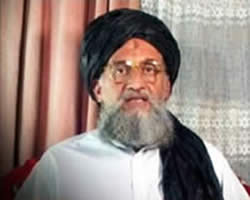
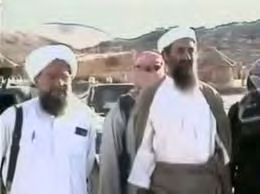
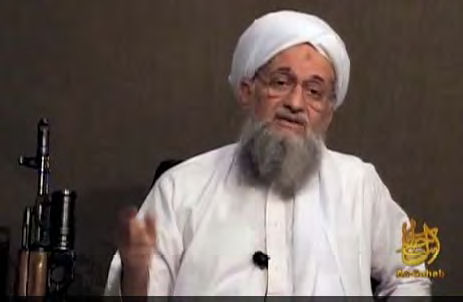




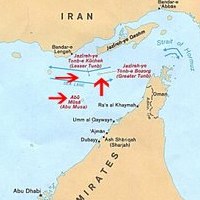




Profile of Dr. Ayman al-Zawahiri, Osama bin Laden's Heir as Leader …: CrethiPlethi | Middle East News, Article… http://bit.ly/qNQdE4
Profile of Dr. Ayman al-Zawahiri, Osama bin Laden’s Heir as Leader of Al-Qaeda | #alqaeda #terrorism #islam http://bit.ly/o8Nqf9
Profile of Dr. Ayman al-Zawahiri, Osama bin Laden’s Heir as Leader of Al-Qaeda | #alqaeda #terrorism #islam http://bit.ly/o8Nqf9
Profile of Dr. Ayman al-Zawahiri, Osama bin Laden's Heir as Leader …: CrethiPlethi | Middle East News, Article… http://bit.ly/qNQdE4
Profile of Dr. Ayman al-Zawahiri, Osama bin Laden’s Heir as Leader of Al-Qaeda | #alqaeda #terrorism #islam http://bit.ly/o8Nqf9
[…] Authentic jihad could conquer non-Muslim superpowers such as the Soviet Union and the United States by creating an alliance of Muslim fighters around the globe. Al-Zawahiri’s response to the threat centered on waging a jihad around the globe. He concluded that there had to be a global jihad because the local jihad campaign had failed. He gave as an example the Islamic movement in Algeria led by the Islamic Salvation Front (FIS). He said it had failed because it had not been sufficiently prepared to fight the authorities and did not receive enough support from jihad fighters (mujahideen) beyond its borders, while France helped the Algerian regime suppress it. via crethiplethi.com […]
Profile of Dr. Ayman al-Zawahiri, Osama bin Laden’s Heir as Leader of Al-Qaeda | #alqaeda #terrorism #islam http://bit.ly/o8Nqf9